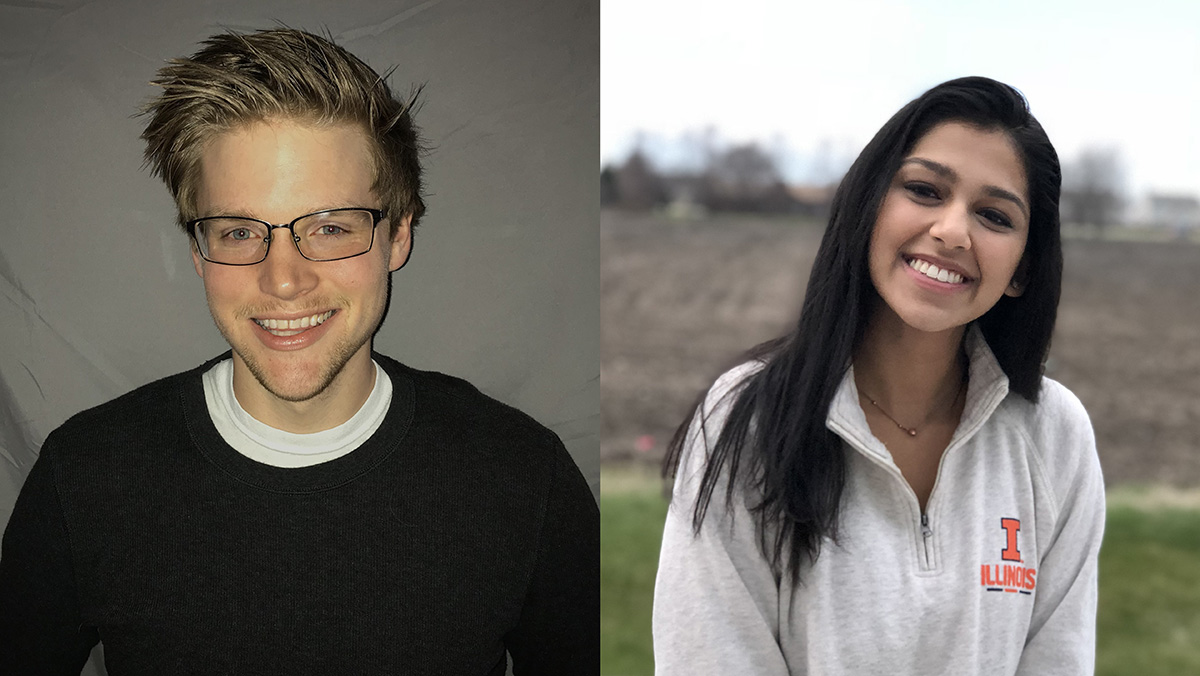The Carl R. Woese Undergraduate Research Scholar program is designed to inspire students to pursue important scientific questions. This year, Peyton Hopkins and Shreyaa Khanna have been selected to carry out their research for a 10-week period, supported by a stipend from the IGB.

Peyton Hopkins is pursuing a degree in molecular and cellular biology and he has been working in the Reddi lab since 2020. Hopkins will continue his research in the same lab where he will study the involvement of the protein TDP-43 in spermatogenesis. The lab has previously found that the sperm of infertile men often have abnormalities in TDP-43. Using mice models, Hopkins will investigate the role of this protein.
TDP-43 has been shown to have a role in several neurodegenerative disorders, including Alzheimer’s disease and amyotrophic lateral sclerosis (ALS). Hopkins will be using mice containing TDP-43 and mutants lacking it to understand the role of the protein. To do so, he will isolate the different cell types from the mice sperm and analyze them. Since the separation techniques and analysis are time-consuming and labor-intensive, he plans to continue his project in the Fall semester as well. “Over the first half of the summer I will be separating the different cell types and I’ll start my analysis in the Fall,” Hopkins said.
“I have always loved nature and I came to appreciate biology during my time in high school and community college,” Hopkins said. “This will be my first summer research experience and I’m excited. During the school year, I can work for only 15 hours a week. However, over the summer I can work upwards of 30-40 hours and I wanted to use that time to pursue research.”
Hopkins is interested in applying to graduate school in the future. “I am trying to figure out my career trajectory as I go. However, I want to pursue biological research and after working in the Reddi lab, I have become interested in studying male reproduction."
Shreyaa Khanna is also pursuing a degree in molecular and cellular biology, with a minor in bioinformatics. Her previous work, carried out remotely in 2020, focused on studying the physiology of kidneys and determining the effects of therapeutic compounds. During the summer she will be working in the Dar lab (BCXT/GNDP/M-CELS) where she will investigate the cell cycle in embryonic stem cells using a fluorescent indicator called FUCCI.
The cell cycle is a 4-stage process that results in the growth and division of cells: G1, S, G2, and M. Embryonic stem cells are unique because they have an unusual cell cycle where the G1 stage is short. Although these stages have been extensively studied, there are very few studies that have looked into how cell cycle stages can be controlled using chemicals.
“The FUCCI indicator can be used to track changes in the cell cycle by color. For example, cells in the G2 stage are green. If you look at these changes over time, you can decide at which stage the stem cells can be manipulated,” Khanna said.
“I have had summer research opportunities in the past that have helped me understand the fundamental aspects of research. Lab work always came to me very naturally and I feel like I have invested in something that I am passionate about,” Khanna said. “I am excited for this summer because I will be able to use the state-of-the-art facilities at the IGB to pursue my research inquiries.”
Khanna is currently a pre-medical student and she is interested in integrating clinical research with medicine. “One of the biggest lessons I have learnt is that research is the pursuit of something through trial and error, which is reflective of how life is—some things work and some things don’t and you need to find what works best for you,” Khanna said.
